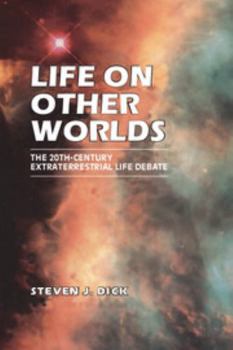Life on Other Worlds: The 20th-Century Extraterrestrial Life Debate
Select Format
Select Condition 
Book Overview
Are we alone in the Universe? From the furor over Percival Lowell's claim of canals on Mars at the beginning of the century to the more recent controversial rock from Mars and the sophisticated Search for Extraterrestrial Intelligence (SETI), the prospect of otherworldly life has often titillated and occasionally consumed science and the public. The search for planetary systems, the quest to explain UFOs, and inquiries into the origin of life have...
Format:Paperback
Language:English
ISBN:0521799120
ISBN13:9780521799126
Release Date:March 2001
Publisher:Cambridge University Press
Length:308 Pages
Weight:0.97 lbs.
Dimensions:0.7" x 6.0" x 9.0"
Customer Reviews
4 ratings
An investigation of what is the most important question
Published by Thriftbooks.com User , 23 years ago
Life, what makes it different from other matter and how it began on Earth are the major questions that have faced humans since we evolved the ability to ask questions. Given recent studies that indicate it arose very early on Earth and it is extremely tenacious once it exists, there is nothing to suggest that it would not arise on other planets, if they exist. Astronomers have pushed the envelope and there is now conclusive evidence that there are planets revolving around many other stars. Therefore, current thinking is that there is no evidence contrary to the likelihood of microbial life on many other planets. Of course, while the discovery of microbes on other worlds would be one of the biggest discoveries ever, the real point of interest is the presence of intelligent life. Conclusive evidence, particularly physical contact, would forever change every aspect of how humans approach all facets of religious, ethical and social behavior. As I read this book and followed the arguments about the likelihood of extraterrestrial life, I was profoundly affected by what I read. To me, the most amazing fact is how quickly life arose on Earth after it cooled to a temperature that would allow it. The oldest known fossils are 3.7 billion years old. Given that this is at most 500 million years after it was possible, this indicates that life may arise quickly. Contrast this with the 3.7 billion years it took for intelligence to evolve and you cannot help but be impressed. Following the stated arguments about the remote probability of life spontaneously developing and you are left with three possibilities: the probabilities are wrong and life arises easily; there was some form of intervention in the creation of life on Earth or the nearly impossible random miracle occurred. Of these possibilities, the third is the least convincing and the first two both strongly indicate the presence of life on other worlds. However, the topics are not restricted to the scientific study of extraterrestrial life. One chapter is devoted to the presence of extraterrestrials in literature and another to the extraterrestrial explanation for UFOs. The idea of life on other worlds has been around for some time, although religious doctrines made it very dangerous to speak of it until after the power of the Catholic church was weakened. It is interesting to read of many scientists arguing, although indirectly, that life can exist elsewhere. The chapter on UFOs was quite interesting. While the extraterrestrial hypothesis is rightly dismissed out of hand, it is acknowledged that some represent events that science cannot currently explain and for that reason, should be the object of serious study. There is a major investigation currently under way that unitizes software that anyone can download to their machines. It runs as a screen saver and sifts through captured radio data looking for signals from another civilization. The web site is http://setiathome.berkeley.edu and I am proud
A fine introduction to the ET debate and its implications
Published by Thriftbooks.com User , 23 years ago
Steven Dick have given the general reader a first rate overview of the contemporary debate over extraterrestrial life. The book is an academic contribution, but is accessible to the non-specialist. He may be at his best in describing what he calls "the biophysical cosmology," which has functioned as a wide-ranging worldview for many of its advocates. The book combines first hand astronomical experience with sophisticated philosophical and sociological reflection.He describes warring parties in careful, measured prose, and doesn't grind any axes. I especially appreciate his treatment of the theological reflections on and implications of the debate--a discussion often ignored in popular treatments of the debate over extraterrestrial life. I highly recommend this book.
Toward a new view of the universe
Published by Thriftbooks.com User , 25 years ago
In recent years, scientists have moved toward a new worldview. The universe now seems much friendlier to life than it was in the old cosmology of lifeless rocks and stars. Steven Dick captures this new worldview in LIFE ON OTHER WORLDS. It is breathtaking in its broad sweep of decades of debate and progress, and highly relevant for understanding today's science. This abridgment and update of "The Biological Universe" is even easier to read than the longer version.
Excellent discussion of the current status of Astrobiology
Published by Thriftbooks.com User , 25 years ago
This book covers the topic of science and theology and the field of Astrobiology in a comprehensive manner. It is thorough in the discussion of most aspects of the debate on life elsewhere in the Universe. I look forward to future discussions by this writer as the fields of physics, biology, astronomy, and mathematics reveal the complex origins of biological life in the Universe and couple it with the realization the creation is not a singular event. It continues as you read this review.





